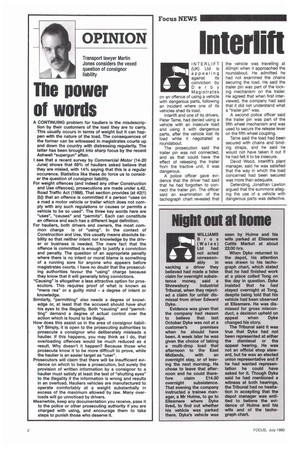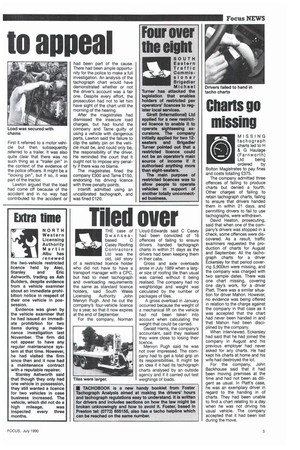!Merlin to appeal
Page 4

Page 5

If you've noticed an error in this article please click here to report it so we can fix it.
INTERLI FT (UK) Ltd is appealing against its conviction by Derby Magistrates on an offence of using a vehicle with dangerous parts, following an incident where one of its vehicles shed its load.
Interlift and one of its drivers, Peter Tame, had denied using a vehicle with an insecure load and using it with dangerous parts, after the vehicle lost its load while it negotiated a roundabout.
The prosecution said the trailer pin was not connected, and as that could have the effect of releasing the trailer from the tractive unit, it was dangerous.
A police officer gave evidence that the driver had said that he had forgotten to connect the trailer pin. The officer said an examination of the tachograph chart revealed that the vehicle was travelling at 41:Imph when it approached the roundabout. He admitted he had not examined the chains securing the load. He said the trailer pin was part of the locking mechanism on the trailer. He agreed that when first interviewed, the company had said that it did not understand what a "trailer pin" was.
A second police officer sad the trailer pin was part of the fifth wheel mechanism and was used to secure the release lever on the fifth wheel coupling.
Tame said the load had been secured with chains and binding straps, and he said he would not have taken it out if he had felt it to be insecure.
David Wood, Interlift's plant manager, said he was satisfied that the way in which the load concerned had been secured was more than adequate.
Defending, Jonathan Lawton argued that the summons alleging the use of a vehicle with dangerous parts was defective. First it referred to a motor vehicle but then subsequently referred to a trailer. It was also quite clear that there was no such thing as a "trailer pin" in the context of the evidence of the police officers. It might be a "locking pin", but if so, it was part of the tractor.
Lawton argued that the load had come off because of the accident and in no way had contributed to the accident or had been part of the cause. There had been ample opportunity for the police to make a full investigation. An analysis of the tachograph chart would have demonstrated whether or not the driver's account was a fair one. Despite every effort, the prosecution had not to let him have sight of the chart until the morning of the hearing.
After the magistrates had dismissed the insecure load charges, but had found the company and Tame guilty of using a vehicle with dangerous parts, Lawton said the failure to clip the safety pin on the vehicle must be, and could only be, the responsibility of the driver. He reminded the court that it ought not to impose any penalty if there was no blame.
The magistrates fined the company £300 and Tame 2150, endorsing his driving licence with three penalty points.
Interlift admitted using an uncalibrated tachograph, and was fined £120.




































































































